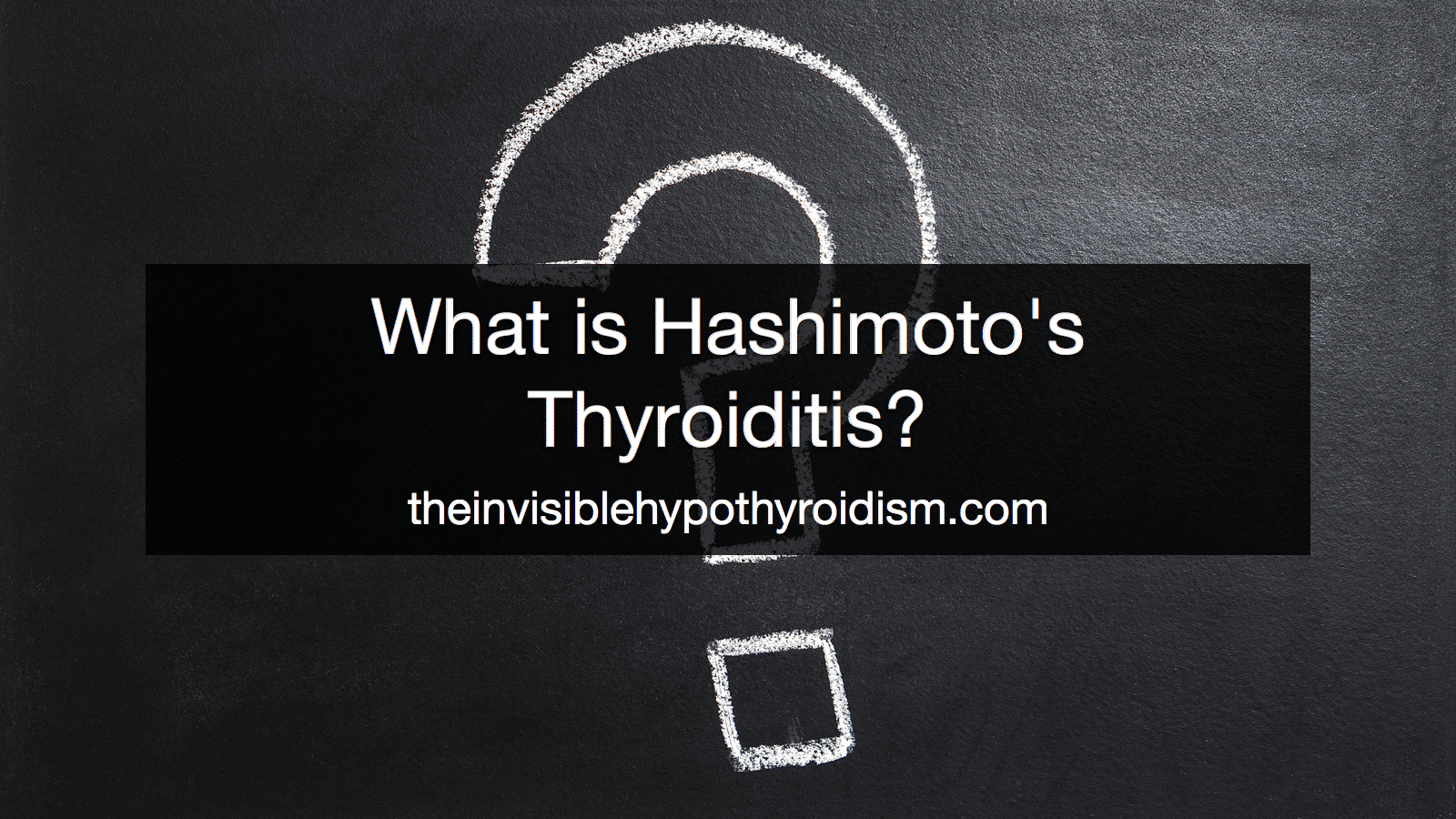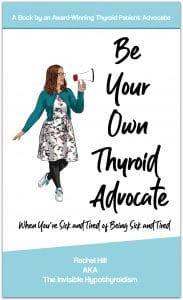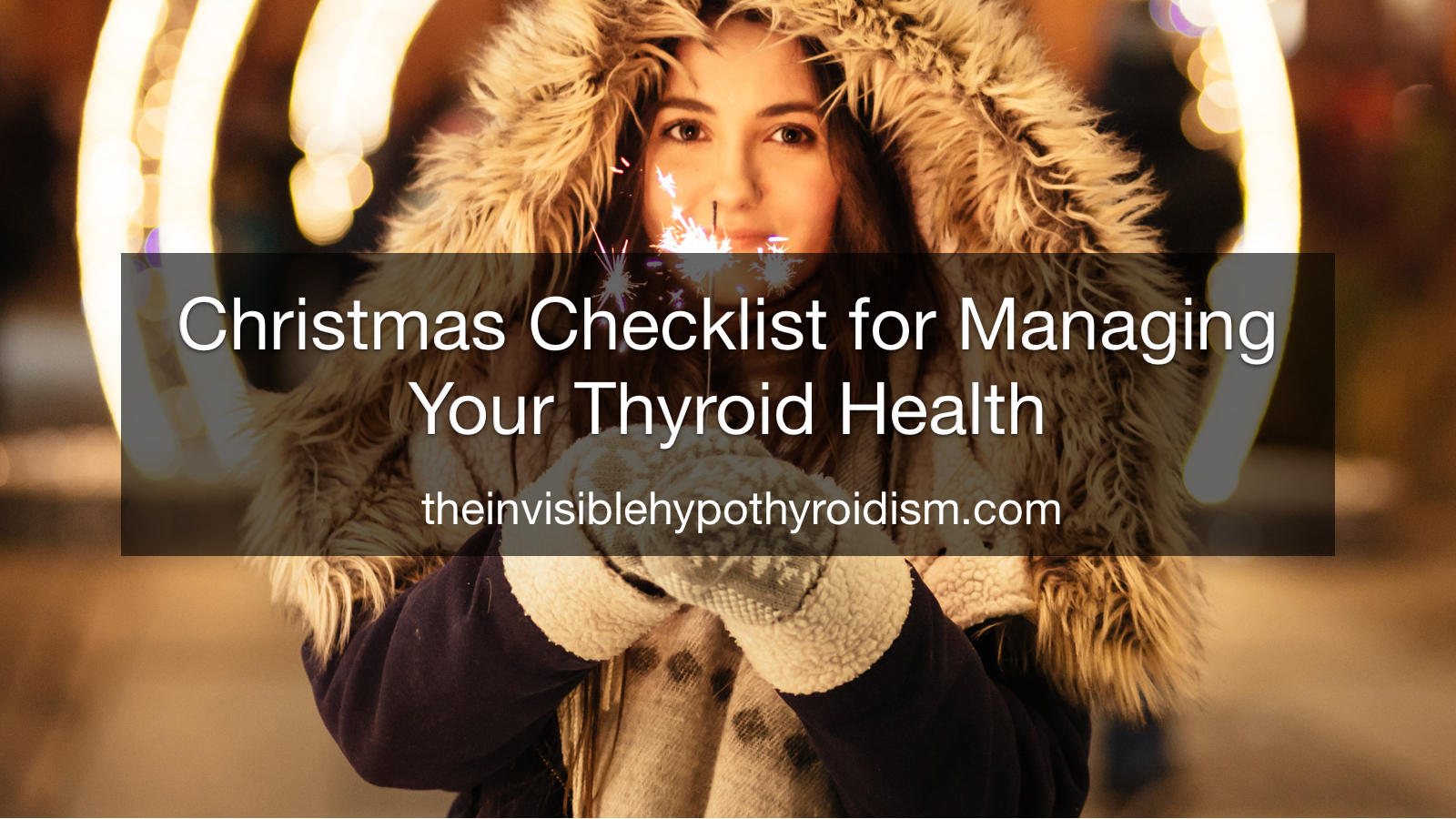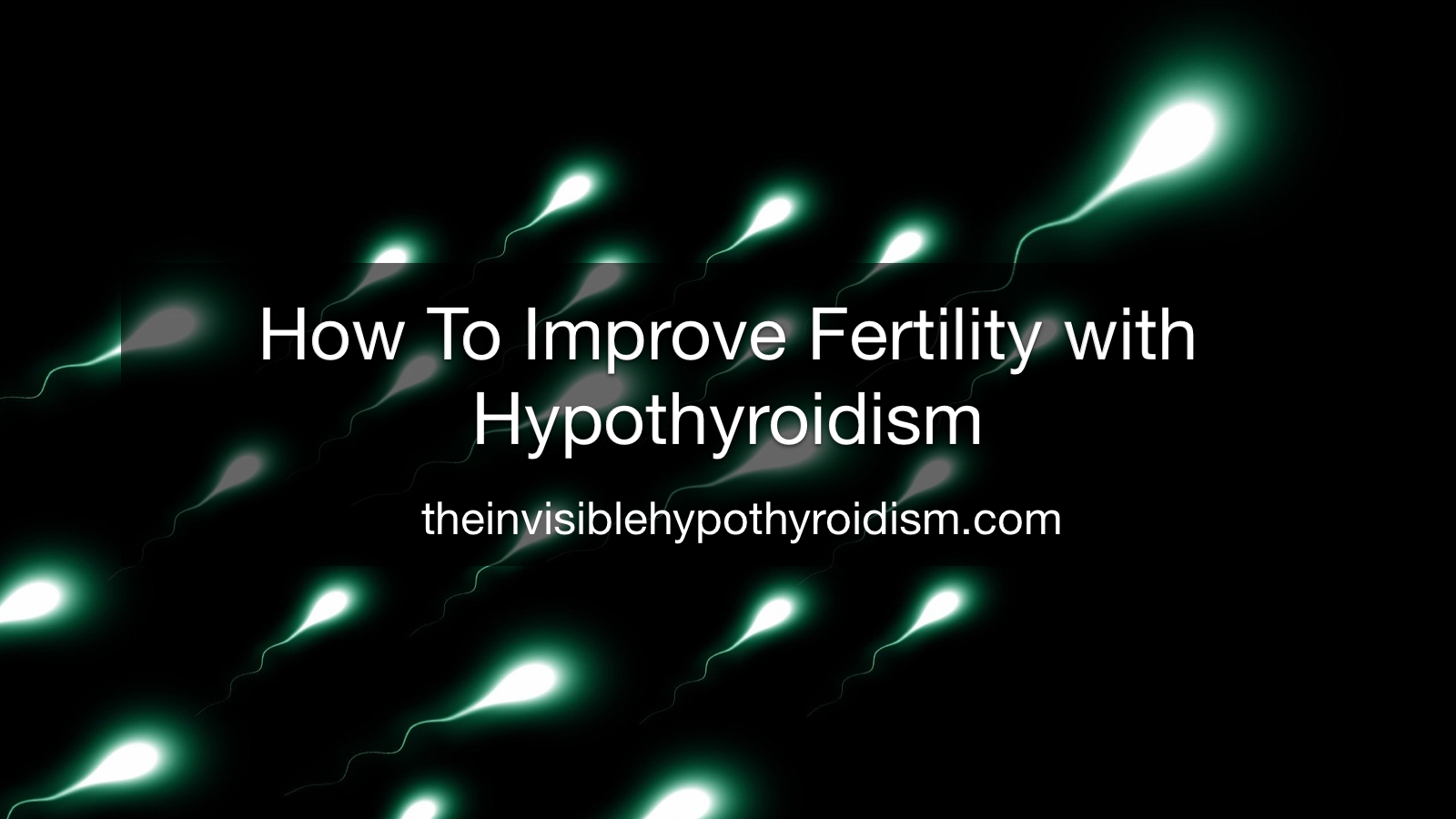Originally published on 20th March 2016 Last updated on 26th February 2019
Hashimoto’s thyroiditis, more often referred to as just Hashimoto’s, is an autoimmune disease and considered to be the most common cause of Hypothyroidism (at around 90% of us) [1], yet thyroid antibodies are often not tested by doctors, who refuse to acknowledge it’s importance.
Related Article: Why It’s Important to Know if You Have Hashimoto’s
You may be reading this right now and have no idea that you even have this autoimmune disease, Hashimoto’s, yet managing your Hashimoto’s as well as hypothyroidism, is so often a huge part of thriving and living well with thyroid disease.
How Do I Know if I Have Hashimoto’s?
To know if you have Hashimoto’s, you need two tests: Thyroid Peroxidase Antibodies (TPOAB) and Thyroglobulin Antibodies (TGAB). Thyroid peroxidase antibodies act against the enzyme thyroid peroxidase (produced by the thyroid gland) in the bloodstream. Thyroglobulin is a protein produced by the thyroid gland, needed for the synthesis of T4 to T3.
You need both Thyroid Peroxidase Antibodies (TPOAB) and Thyroglobulin Antibodies (TGAB) to be checked, as often just the one test is not accurate enough to be sure. One could have results ‘in range’, while the other not. You only need to be over range with one of these types of thyroid antibodies to have Hashimoto’s, but monitoring both is useful.
If you’re not yet sure if you have Hashimoto’s as the cause for your hypothyroidism, you can test for it yourself here (a worldwide testing company) and here (for those in the UK).
Having Hashimoto’s will usually show as TPOAB and TGAB test results being above range, although it is believed that 10% of people with it don’t show on tests at all. It is worth knowing that you could see variations in your thyroid antibody and TSH results each time you test too, with them being high one time and low the next. This is due to be a common sign of Hashimoto’s (swinging test results) as ongoing destruction of your thyroid gland causes sudden surges of thyroid hormone to be released into the blood.
This is why it can be important to manage your Hashimoto’s in the form of lowering thyroid antibodies and keeping them low, as this signals that the condition is in remission and better managed. I.e. the progression of the disease is slowed down or halted.
Why Would a Doctor Not Test These?
Unfortunately, it is common for doctors to refuse to test your thyroid antibodies, though, as they may not to see the importance of knowing whether your hypothyroidism is autoimmune, because for many doctors, they’re going to give you the standard T4-only medication whether you have Hashimoto’s or not. But it matters entirely.
You could choose to go private to have these tests done or even order them yourself online. I soon learnt that many thyroid patients had turned to doing this and ordered them myself online too. It formed an important part of getting my own Hashimoto’s into remission. If your doctor refuses to treat you, with antibodies out of range but a TSH ‘in range’, then this is not accurate in diagnosing Hashimoto’s.
You can read about treatment of Hashimoto’s and lowering antibodies here.
So What Exactly is Hashimoto’s?
Hashimoto’s causes the body to attack and destroy its own thyroid gland, causing hypothyroidism as the thyroid begins to dysfunction from the damage caused. As time goes by, if this autoimmune disease is not well controlled, your body continues to attack and destroys the thyroid as if it is the enemy, which can cause your levels to gradually get worse and worse, meaning further increases in thyroid medication dosage and worsening symptoms.
Optimal thyroid medication, whether NDT, T3 and T4 or just T4, is of course important to feeling better, but with Hashimoto’s you need to look at some other things too.
What Difference Does It Make If You Do Have Hashimoto’s?
Well, it means that you should ideally be looking at calming down the disease and lowering those high antibody levels. It is believed that this means the attack against your thyroid is slowed down or even halted, meaning that symptoms disappear and recovery can begin.
Read about how I got my Hashimoto’s in to remission here.
Related Article: What is the Difference Between Hypothyroidism and Hashimoto’s?
What Can I Do?
It’s very much an individual thing, and different people find that different interventions help them to get their health back on track. I documented what did it for me here.
Optimal thyroid levels are always important, whether you’re on NDT, synthetic T3 and synthetic T4 or just synthetic T4 alone and is of course important to feeling better, but with Hashimoto’s you’ll probably need to consider some other things too.
Most commonly, cutting out gluten from your diet entirely is said to be the most beneficial thing a Hashimoto’s patient can do to relieve Hashimoto’s symptoms and lower antibodies. This is due to gluten triggering the same autoimmune reactions that cause you to have Hashimoto’s in the first place, since the cells of your thyroid are similar to that of gluten, and it confuses your body, increasing inflammation and antibodies as an attack on your thyroid is launched, destroying even more thyroid tissue, and so worse hypothyroid symptoms occur.
As a result, many Hashimoto’s patients eliminate gluten from their diet, and see good results.
Something like this is always worth a trial, and giving it a few months (at least) will give you a good idea on whether it helps you. I have created a How-To article here.
Other food sensitivities with Hashimoto’s are also common – dairy, nuts, eggs, citrus foods etc. You can try an elimination diet whereby you remove them for a period of time and then reintroduce them one by one and keep a close eye on your symptoms to see which are your issue.
It is also important to check your adrenal health. A lot of thyroid patients have some degree of adrenal dysfunction. The adrenal glands manage our response to stress and danger and with Hashimoto’s, we often have inflammation or other disruptions going on in the body that the adrenals react to with the stress response. Over time, this can be just as debilitating as hypothyroidism in its own right. You can find testing options for adrenals here and here.
Having a leaky gut, yeast overgrowth (Candida), GERD, acid reflux or other digestive/abdominal issues or complaints is also very common with Hashimoto’s, as the gut lining becomes compromised over time, or yeast becomes overgrown, opening us up to issues such as food sensitivities, reflux, constipation and even difficulty absorbing nutrients and vitamins. Low levels of iron, B12 and Vitamin D can be a sign and must be addressed. Each one can cause their own set of symptoms on top of your hypothyroid symptoms. A UK test for Candida can be found here and a US test here.
Hashimoto’s also puts us at an increased risk of blood sugar imbalances. Before I realised the importance of managing my blood sugar levels, I would get ‘hangry’ (hungry and angry) several times a day, as my blood sugar would drop after a big spike from the sugar and carbs I was eating a lot of.
Other signs of blood sugar imbalances also include headaches, feeling faint and dizzy, feeling hungry again quickly after eating, feeling tired, grouchy and irritable, though. Until recently, I wasn’t aware that these low blood sugar moments were putting a lot of stress on my adrenals and also likely contributing to my high thyroid antibodies. So learning how to manage your blood sugar by eating foods that stabilise it, is also important.
Have you confirmed if you have Hashimoto’s?
Related post: Can You Have Graves’ Disease as Well as Hashimoto’s?
See also:
The book Be Your Own Thyroid Advocate: When You’re Sick and Tired of Being Sick and Tired, which covers Rachel’s personal story of how she got her Hashimoto’s under control.
You can click on the hyperlinks in the above post to learn more and see references to information given.
References:
[1] https://www.ncbi.nlm.nih.gov/pubmed/3066320








17 Comments
Glenda Crain
August 8, 2023 at 11:48 pmRachel is there any way to email you personally?
Rachel Hill
August 13, 2023 at 10:12 amMy email is [email protected] but bear in mind I cannot give medical advice, nor guarantee a response to all emails I receive. The hours I have available to read and answer emails is extremely limited at the moment.
Cecila Brumby
July 31, 2019 at 3:43 pmIts like you read my mind! You seem to know a lot about this, like you wrote the book in it or something.
Rachel Hill
August 1, 2019 at 12:18 pmI do actually have a book! – https://amzn.to/2SxGcn8
R M
March 25, 2019 at 4:19 pmThis blog was… how do I say it? Relevant!!
Finally I’ve found something which helped me.
Appreciate it!
Nila
October 6, 2018 at 1:27 pmI’m not that much of a internet reader to be honest but your blogs really nice, keep it up! Many thanks
Rachel Hill
October 8, 2018 at 12:39 pmThank you, happy to have you here!
Scotty Hardeman
September 17, 2018 at 4:00 pmExcellent write-up. I love this website.
Thanks!
Eunice Randell
September 11, 2018 at 11:30 pmYou’ve made some decent points there. I checked on the internet for additional information about the issue and found most people will go along with your views on this web site.
Tawanda Pierron
June 19, 2018 at 10:09 amI’ve learned many important things through your post.
Rachel Hill
June 22, 2018 at 2:11 pmI’m glad!
Rueben Headly
June 13, 2018 at 6:43 pmHi! Do you use Twitter? I’d like to follow you if that would be okay. I’m absolutely enjoying your blog and look forward to new updates.
Rachel Hill
June 15, 2018 at 8:50 amYes, https://twitter.com/Invisible_Hypo 🙂
Daniela S
April 25, 2018 at 6:30 pmYou are so interesting! So good to find another person with original thoughts on this subject.
Really.. thank you for starting this up.
Shannon
April 7, 2018 at 10:17 amI have a question, what if my thyroid was removed, in two operations, in the same week. Result confirmed papilloma carcinoma. Do I still have Hashimotos that was actually only diagnosed after both operations, or has that gone now that I have no thyroid?
Rachel Hill
April 8, 2018 at 12:06 pmYes, Hashimoto’s doesn’t go away with a thyroidectomy unfortunately.
nova
March 19, 2018 at 2:53 pmRight here is the perfect website for anyone who would like to
understand hypothyroidism. You understand so much its almost hard to argue with you
(not that I personally would want to HaHa